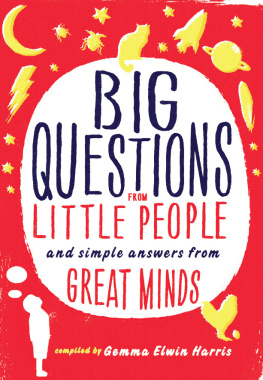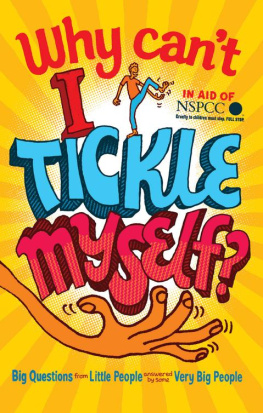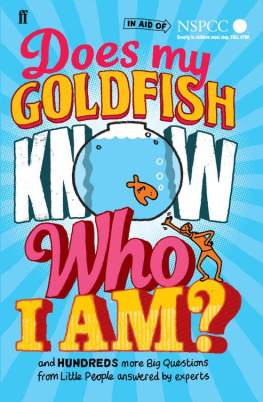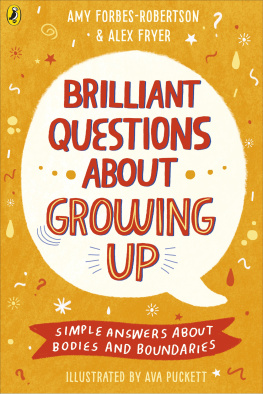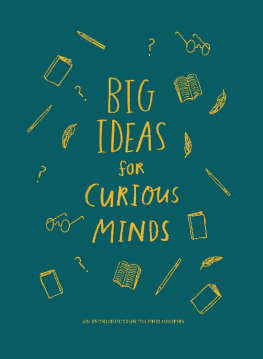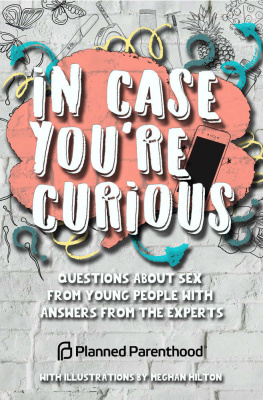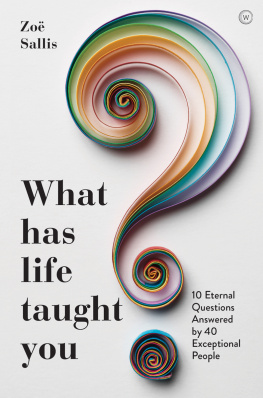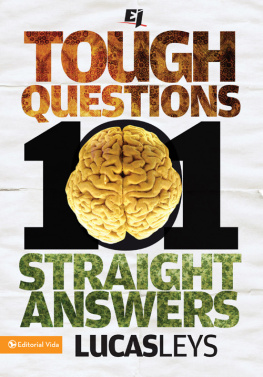
BIG QUESTIONS
from Little People... and Simple Answers from
GREAT MINDS
Compiled by
Gemma Elwin Harris

To Evie, Rosie, Eliza and Seth
The pursuit of truth and beauty is a sphere of activity in which we are permitted to remain children all our lives.
Albert Einstein
CONTENTS
My son is two years old and already the questions have started. Recently he pointed at the moon as we hurried home from nursery and asked, What dat? For now, Thats the moon will do as answer, but I know it wont be long before Im struggling to explain what the moon is made of, how far away it is, and whether a goldfish could survive there.
The questions children ask are often baffling. Chances are, if you ever knew the answer or even part of the answer youve probably forgotten it or can only remember a half-baked version of the truth. Imagine if you could turn to a well-known expert at this point and get them to answer for you, in language simple enough for a child to understand. This was the idea behind BIG QUESTIONS .
With the help of ten elementary schools, we asked thousands of kids between the ages of four and twelve to send us the questions they most wanted answered. The results were fascinating and funny. There were cute and quirky questions, like Why is space so sparkly?, Who had the first pet? and Can a bee sting a bee? Others were fiendishly difficult: How is electricity made? or Where do oceans come from? And a few shot straight to the heart of a deep philosophical conundrum: Why do we have wars?, How do we fall in love? and Where does good come from?
Among their hand-written replies we found a lot of questions involving bodily functions. Why is wee yellow? seemed to be a recurring concern. The mysteries of space clearly obsessed many children, and its no surprise that animals chickens, cows and monkeys popped up frequently. There was even one question, of great genius, that encapsulated all the above a perfect storm of cows, bowels and space travel: If a cow didnt fart for a year and then did one big fart would it fly into space?
What would world experts say, when faced with these questions? The response from our panel has been staggering and heart-warming. However busy, theyve carved out time to co-write this book in order to benefit the NSPCC the UKs leading child protection charity.
Bear Grylls took the trouble to explain the nutritious benefits of eating a worm. Jessica Ennis emailed a mantra for aspiring Olympians, just two months before the 2012 Games. Derren Brown set his impressive grey matter to work on Is the human brain the most powerful thing on earth? While Philippa Gregory put her latest novel on hold to shed light on why Guy Fawkes was so naughty. No question was too bizarre. The historian Bettany Hughes barely blinked when we asked her Did Alexander the Great like frogs?
This book doesnt claim to offer the only answers to these questions. Its an anthology of voices, a personal response from each expert to a childs idiosyncratic question. We hope you enjoy reading them with your family and take something from them including the mental image of a cow soaring into the stratosphere powered by its own methane. (Thanks to the science writer Mary Roach and her friend Ray, a real life rocket scientist, for running the maths on that one.)
When my son asked his question about the moon that evening, I was busy making a mental list of what we had in the fridge for dinner. Lying back in his buggy, he was taking in the beauty of the night sky. There above, he saw a pale and ghostly globe shining in the darkness for the very first time. His question What dat? demanded I see that full moon too. So we stopped and stared, and how strange and new it seemed to us both.
Gemma Elwin Harris
I cannot thank enough the brilliant and extremely busy scientists, historians, philosophers, psychologists, naturalists, explorers, artists, musicians, authors, archaeologists and paleontologists, sportsmen and women who took time to answer a childs question for this book. As well as the much-loved comedians who wrote one-liners for our Out-Takes chapter. It would take too long to thank you each individually here but Id just like to say how much your kindness has been appreciated by the NSPCC.
Without the enthusiastic participation of ten schools, wed have had no childrens questions to ask. So a special thank you to the staff and pupils at: Corstorphine Primary, and Mary Erskine and Stewarts Melville Junior School, Edinburgh; Cleobury Mortimer Primary School, Shropshire; Woodland Grange Primary, Leicester; Furzedown Primary School, Tooting; Raysfield Infants School, Chipping Sodbury; The Mulberry Primary School, Tottenham; Shottermill Junior School, Haslemere; Boxgrove Primary School, Guildford; and Grange Primary, Newham. In particular to Gillian Lyon the deputy head at Mary Erskine and Stewarts Melville, Caroline Gorham, and Ed Flanagan and Kirk Hayles at Woodland Grange Primary for their BIG QUESTIONS assembly.
To friends whose curious offspring, nieces and nephews got the first questions rolling in: The Scott clan, the Wrays, the Flemings, Lucinda Greig and extended family, Melonie Ryan, Wendy and Alfie Carter, Cat Dean and brood, Nicole Martin, Ben Crewe and Ruby, Esther and Hannah Davis.
For ideas, advice and introductions: Yana Peel of Outset UK, Joe Galliano, Simon Prosser, Jamie Byng, Marcus Chown, Duncan Copp, Chris Riley, Richard Holloway, Justin Pollard, Roger Highfield, Chris Stringer, and Giles Morgan at HSBC sponsorship. Not forgetting dear friends Gus Brown, Sally Howard, Amy Flanagan, Ngayu Thairu, Chris Hale, Catherine and Ralph Cator, Bex and Adam Balon, and my sisters Sophie and Lucinda whose encouragement, contacts and science-brains Id have been lost without.
Im grateful to those patient agents who went above and beyond: Jo Sarsby, Nelle Andrew, Sue Rider and Sophie Kingston-Smith, Stephen at Michael Vine Associates, Catherine Clarke, Caroline Dawnay, Hannah Chambers and Vivienne Clore.
A heartfelt thank you to my own agent Gordon Wise at Curtis Brown and to my editor Hannah Griffiths for embracing the project straight off and devoting careful thought and creativity to it ever since. To the team at Faber & Faber: Lucie Ewin, Donna Payne, Sarah Christie; and our illustrator Andy Smith. Also to Kristine Dahl at ICM and Hilary Redmon at Ecco, HarperCollins, for their commitment and vote of confidence from across the pond. Everyone involved in BIG QUESTIONS is massively excited to be taking it to the US.
Which brings me to the sparky teams at the NSPCC. My respect and admiration goes out to you and I hope the proceeds from this book go some way to supporting the vital work you do every day. Charly Meehan, Viola Carney, Stefan Souppouris, Helen Carpenter, Lucie Sitch, Sarah Dade, Dan Brett-Schneider and the Fundraising Communications Team youve been fantastic to work with.
Finally, love and thanks to my gorgeous husband, Nick. It would take a book to list the reasons why.
Sir David Attenborough
naturalist
Yes. Hundreds. Probably thousands. Exactly how many no one can say because they have not yet been discovered.
If you spent a day in a tropical rainforest, swishing a butterfly net around through the undergrowth or the leaves high in the tree canopy, you would certainly collect hundreds of insects. Many of them would be beetles. Would any of them be unknown to science? You would have to ask a beetle scientist. Many he would recognise straight away. But there might be a few that would puzzle him.
Next page
